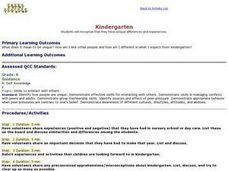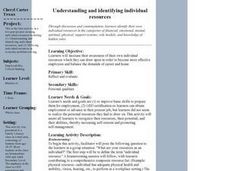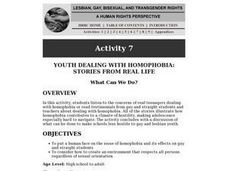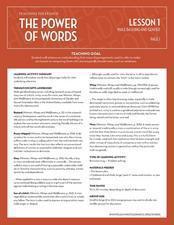Curated OER
What Are Friends For?
Students develop an awareness of the behaviors signaling that a friend may be in trouble with alcohol or drugs of abuse. They practice ways to encourage a friend to seek out adult help by viewing a video, role-playing situations, writing...
Curated OER
Growing on My Own, Kids on the Grow
Students participate in an after school program that promotes critical thinking, concern for others, recognizing differences, accepting differences, self-motivation and personal safety. They cover how kids develop, expressing different...
Curated OER
Wilderness Survival: A Field Practicum
Students use hands-on field-testing of authentic application from principles pertaining to: Psychology- A. Develop a positive, can-do attitude with a high degree of self-reliance that is transferable to human interactions outside of the...
Curated OER
Smoke Signals
Students explore the implications of tobacco use. In this personal health lesson, students participate in a classroom activity that calls for them to characterize a smoker and then examine the harmful effects of smoking on his/her body.
Curated OER
Kindergarten
Students engage in a discussion about their preconceived ideas about kindergarten. They share their feelings about being in kindergarten and listen to the book "Oh, The Places You'll Go!" by Dr. Seuss.
Bully Free Systems
Bully Free Lesson Plans—11th Grade
It takes courage to stand up to bullies. Two sample lessons from a complete Bully Free curriculum, "Courageous and Brave Bystanders" and "Assertiveness Skills for Bullied Students and Empowered Bystanders" provide participants with...
Health Smart Virginia
Surviving High School Awareness Campaign
To demonstrate what they have learned in the Health Smart unit, sophomores design a resource for incoming ninth-graders that includes what they consider the most important information they gleaned from one of the eight topics studied.
Curated OER
Understanding and Identifying Individual Resources
Students identify their own individual resources in the categories of financial, emotional, mental, physical, role models, knowledge of hidden rules, and support systems.
Curated OER
Assessing Health Habits
Seventh graders discuss what are the characteristics of a personal with good health. They read an article about influences on health and discuss and perform a self assessment to gauge their personal health. They then go to the gym and...
Curated OER
Better Weight
Students investigate a Biblical based weight loss program which asks them to read, take on-line quizzes and tests, assess their level of physical activity, explore nutrition and food guidelines and determine whether weight loss would be...
Curated OER
The Witch of Goingsnake
Pupils complete literary analysis and writing activities using The Witch of Goingsnake. In this literary analysis lesson, students interpret a proverb, read poems, complete a quaker reading, and complete research for the lesson. Pupils...
Curated OER
Youth Dealing With Homophobia:Stories From Real Life
Young scholars read testimonials of real gay and lesbian teenagers dealing with homophobia. They discuss how to create an environment that respects all persons regardless of sexual orientation. They discuss a variety of emotions that...
Curated OER
Noncommunicable Diseases
In this chronic diseases instructional activity, students read and identify with a chronic disease called asthma. They discover how a person deals with a chronic disease and explain if they can still participate in most activities....
Curated OER
The Dancing Flute
Young scholars use a cardboard tubes as props as they create their own dance steps to express the emotions invoked in a portion of The Nutcracker by Tchaikovsky.
Curated OER
Want to Save a Sheep This Season?
Students investigate facts about sheep. They watch a video about the sheep industry. Students research practices in the wool industry. They discuss alternatives to wool. Students participate in humane education activities.
Curated OER
Bullying and Teasing
In this bullying and teasing worksheet, students read a set of guidelines on how not to bully, then complete a set of discussion questions based on a referenced DVD. Suggestions for writing assignments and activities are also given.
Curated OER
Expressing Feelings
Students practice pantomime movements. In this body awareness lesson, students discover how to convey emotions through physical movements. Students practice conveying happiness and sadness through physical movement.
Curated OER
Creating Clinflict Through Gibberish
Students explore ways to communicate and solve conflict. At the beginning of class, students must communicate emotions without using words. They brainstorm important relationships in their lives. Next, groups of students create a...
Curated OER
Aboriginal Physical Education
Learners engage in p.e. activities that have roots in native Indian, Metis, and Inuit cultures. They practice the skill involved and listen to the significance behind the skill. They read relevant books and define new terminology.
Curated OER
Finding Your Feelings
Students examine different slides of artwork from different artists. They discuss how art can show feelings and emotions. They share their opinion of the artwork.
Curated OER
Reflections About Diversity
Students discuss conflicts that arise from problems with diversity issues, and hypothesize what is needed to bring about successful resolutions to these problems. They write a newspaper editorial about how conflicts can be successfully...
Curated OER
Sculpture, Hands, and Rodin
Learners explain that Rodin saw hands as able to express the emotions of the entire body. Our hands are important tools and means of expressions. They create a sculpture based on a pantomime they make with their hands.
Curated OER
Scientific Inquiry
Middle schoolers make inferences about what activities occur at different places in school. They form a hypothesis as to how space is used. They simulate how archeaologists explore past people by designing and conducting a research project.
Curated OER
The Power of Words: Male Bashing and Gender
Students brainstorm words that typically describe men or women. They also brainstorm words that are insulting to both genders. They answer questions about the activity and discuss their answers.






